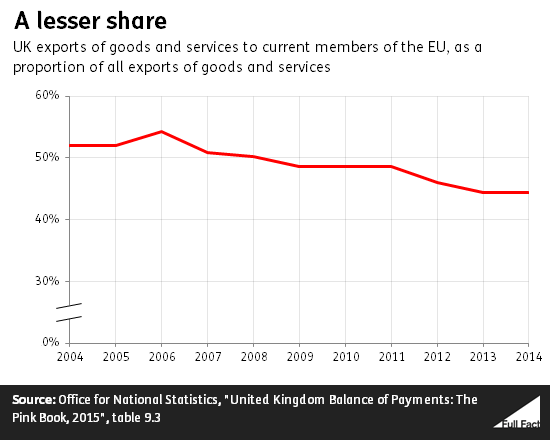Trade with the EU, nurses, and tuition fees: factchecking Prime Minister's Questions
Join 72,953 people who trust us to check the facts
Sign up to get weekly updates on politics, immigration, health and more.
Subscribe to weekly email newsletters from Full Fact for updates on politics, immigration, health and more. Our fact checks are free to read but not to produce, so you will also get occasional emails about fundraising and other ways you can help. You can unsubscribe at any time. For more information about how we use your data see our Privacy Policy.
Trade with the EU
"Three million UK jobs are linked to trade with the EU"—Angela Eagle
Recent estimates suggest somewhere around three to four million jobs are linked to trade with the European Union. These are jobs linked to trade with the EU, as Ms Eagle said, not EU membership per se.
These estimates broadly assume that the proportion of employment linked to EU exports is roughly the same as the proportion of the UK's output based on EU exports and adjust for employment in different parts of the economy.
In terms of the potential impact of a 'Brexit', Jonathan Portes (senior research fellow at the National Institute for Economic and Social Research, which produced one of the earlier estimates) has noted that "there is unlikely to be any significant long-run impact" on employment.
One of the authors of the original research on this topic, Professor Iain Begg, told the Telegraph last year that leaving the EU wouldn't mean an overnight loss of jobs or prosperity, but that these jobs become "a bit more vulnerable".
Read our briefing for more information.
"Half our exports go there [to the EU]"—Angela Eagle
About 44% of our exports of goods and services went to countries in the European Union in 2014. So not quite half. The last time the proportion of exported goods and services heading to the EU crossed the 50% line was in 2008. This proportion has been generally declining since 2006.
You can reach 50% in 2014 by only looking at trade in goods—which excludes over 40% of all of the UK's exports.
It's been suggested that exports of goods to the EU are overstated due to the 'Rotterdam effect', where goods are re-exported from places outside the EU through ports in the EU. ONS estimates attempting to adjust for this effect for trade with the Netherlands indicate that somewhere between 46% and 50% of the UK's goods exports head to the EU (more on this here).
Nurse training
"Currently, we have a situation where two-thirds of the people in England who apply for nurse training courses are turned down."—George Osborne
We've asked the Treasury where this number comes from.
It's possibly from the Royal College of Nursing. Earlier this year the Telegraph attributed it to the organisation's then chief executive, Dr Peter Carter. He said that there were 57,000 applicants for nursing courses last year but 37,000 of them—roughly 65%—were rejected.
These figures are slightly different to some we've seen before from the College. It has previously said that in 2014 there were 53,000 applicants in England, and 31,000 of these weren't accepted onto a course. That's 60%, so three-fifths of applicants.
Both figures are from the body that processes university applications, UCAS. The number of accepted applicants is publicly available on the UCAS site, but the number of applicants was provided to the College on their request. UCAS told us they were correct.
We don't know why the numbers behind that "two thirds" estimate are different (it's possible they refer to applications for courses starting this year), and have asked the College if it can help.
Tuition fees
"When the Chancellor tripled tuition fees he set the repayment threshold at £21,000. He has now frozen that threshold and the Institute for Fiscal Studies tell us that many students will bear many extra thousands of pounds in repayments".—Daniel Zeichner
"When they [the Labour party] introduced tuition fees, the payment threshold was £15,000. We've increased that to £21,000".—George Osborne
The repayment threshold is the income level at which graduates have to start repaying their student loans. The 2012 tuition fee increase came with an increase in the threshold at which graduates start repaying, from £15,000 to £21,000. This meant that graduates were repaying less per year than they would have done under the old system.
The intention was that this £21,000 threshold would "periodically" be increased to reflect earnings. So far this hasn't happened, and the government has opted to keep it at this level until 2021. Doing so, according to the Institute for Fiscal Studies (IFS), will mean that its value will over the five year period decrease close to the value of the pre-2012 threshold (the £15,000), once inflation has been taken into account.
That means that some students will be paying back more money than they would have done, had the threshold increased.
The equivalent impact between the threshold being increased in line with inflation each year and it staying the same is that graduates will be repaying just under a further £4,000 on average (at present value), according to the IFS.
It says that middle-income graduates will be hit hardest by this change, seeing their annual repayments rise from £900 to £1,100 (in 2016 prices).
